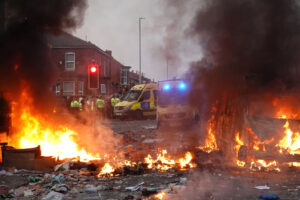Unusual for the time of year, the radiant sun was setting over the picturesque city. It was the early evening of 5 April 1992, and while some Sarajevo’s residents were listening to the opera, lovers could be seen strolling along the Miljacka river. The following morning, the city woke up to bodies in the streets.
Admittedly, tensions had been rising for over a month as politicians and fascists politicised a murder at a wedding to sow hatred and division. But nobody expected it to come to this. How could a European city so rich in culture and on the road to development be torn apart by such brutal violence? Overnight, Sarajevo had become a byword for the dangers of ethnic division, ultra-nationalistic fervour, tribalism and wanton extremism.
The events of the past few days in the United Kingdom reveal a number of familiar traces. Southport has become synonymous with Sarajevo, in the sense that, once again, under the watchful sun a small extremist minority is seeking to politicise a brutal tragedy and turn it into something whose consequences reach across the country. This is not protest; it’s about violence, terror and a naked appeal to intimidation.
The idea of a civil war has traditionally referred to an internal conflict where one armed group seeks to wrestle power from the state. While some may brush this aside by suggesting a civil war is not something that the British do, we should not be so complacent. Remember, after all, that alongside the American version, the English civil war between 1642-51 remains one of the most instructive. As a result of this very British version of civic slaughter, the modern theory of sovereignty appeared in Thomas Hobbes’s Leviathan. Not only did it put forward the now-familiar mantra that there is no politics without security and no security without the state, it also set in place the fundamental understanding — later picked up by Max Weber — that only the state can engage in legitimate violence.
What marks a civil war from this perspective is a contesting of that very monopoly and the state’s right to use force for the preservation of order. That the police forces who appear on the front lines often become the first targets is not then incidental. But where is the line that needs to be crossed so that civil tensions become a war? Since the Seventies, critical thinkers such as Michel Foucault sought to invert the logic of civil war to explain how states are always waging a kind of silent battle upon minority groups. Through this, notions such as structural violence emerged. Presenting a civil war as a process — one that is not always about widespread slaughter but can also be measured in terms of a broader account of violence and social tensions — does have some merit. The danger with such reasoning, however, is that if everything is a civil war, nothing is.
If Sarajevo made explicit how the new emerging contours of civil war would be written in ethnic terms, it had already been shown in Somalia, Mexico and later Rwanda how the very idea of a civil war was no longer bound to single movements whose sole aim was the capture of the state. Such unbounded violence went global with 9/11, which revealed the utter nihilism of certain ethnic doctrines. It also showed how the lines between race, religion and political beliefs are far from homogenised.
Political violence has since been very much driven by ethnic division, which speaks to a problem that is far more expansive than reductive explanations that focus on race. Of course, there are some overlaps between race and ethnicity, but they are not mutually exclusive. A failure to recognise this means we fail to properly understand the causes and the solutions.
Three decades on from the violence in Yugoslavia, the world is undeniably a different place. The UK political landscape is notably a world away from how it looked in the early Nineties, divided as we have become by all the social media tensions that, as recent days have shown, actually makes violence easier to provoke by non-uniformed and misinforming online generals. This has been matched by the Americanisation of our political system, where performativity — including the performativity of violence and outrage — has replaced substance and where the complex lines of identity and ethnicity have been reduced to crass caricatures based on neat categories of race, sex, gender and whatever other category we care to impose.
The category of race, for example, in itself tells us little about a person’s privileges or political and religious beliefs. That is why counter-narratives around “whiteness” are also unhelpful here; just as they are useless in explaining why many black and Asian people in the US support Donald Trump, or why Enrique Tarrio ,who is of Afro-Cuban descent, became the chairman of the neo-fascist organisation Proud Boys. We should not forget their cos-play riot on Capitol Hill, for what that pantomime showed was such movements today really don’t expect to be able to take on the state. Instead, their enemy are other Americans who have a different vision of what being American actually looks like.
Unlike in Britain, the idea of a possible civil war there has been part of mainstream discussion in America for some time now. Indeed, what marked out Alex Garland’s compelling film Civil War was precisely its plausibility. Garland revealed one of the truisms of a civil war, where its experience is never universally shared. A civil war has never meant that every street is a battlefield. The violence is always concentrated. Witnessing the streets ablaze in Belfast at the weekend should remind us of this. That city, which for many impartial observers looked on the precipice of a civil war for a number of decades, was also liveable even as the ethnic divisions required the physical construction of walls. Belfast also shows how the lines of ethnic divisions are never static but take on new forms.
How should we respond to it? Many have dismissed those engaging in the weekend’s violence by emphasising its thuggery and blaming the likes of Tommy Robinson or Nigel Farage. While I sympathise with this instinct — the criminality was parasitic and abhorrent — it shouldn’t come at the expense of understanding that it was also carried out in the name of a certain ethno-nationalistic vision. So, just as we asked “why do they hate us?” in the aftermath of 9/11, so we must now ask “why is there so much hatred in Britain?”.
A staple explanation in studies of global conflicts since the mid-Nineties has been the idea that poverty is the greatest single cause for violence. Indeed, the edict that underdevelopment was dangerous has been advanced by every single international organisation and humanitarian group tasked with mitigating conflict and violence. Certainly, areas of Britain are desperately poor at the moment. And they have been suffering from the fallouts of years of austerity, the impact of Brexit and the costs of the Covid lockdown. That the anger is spilling out from those areas is cause enough for deeper reflection. But we should not fall into the trap of reducing everything to a question of economy.
One of the best books written on the rise of extremism and how a small minority can change the course of history is Wilhelm Reich’s The Mass Psychology of Fascism, which was published as Hitler was coming to power in 1933. Reich encouraged us to move beyond simplistic explanations for fascism’s rise. Instead, he asked us to question the fascist that exists within each of us. We can all learn to desire power and violence, and seek to belittle, shame and intimidate others. Fascism as such doesn’t solely reside on the Right or the Left of the political spectrum. Any identity or ethnicity can become fascistic, just as any identity or ethnicity can become peaceful and welcoming.
Despite the protestations of radical moral puritans, then, there is nothing inherently fascistic about Englishness, the flag of St George, or any other symbolic accoutrements. It is instead about how they are mobilised and whether they are appropriated in the service of violent means.
History needs heeding. As Reich showed, once fascistic desires are liberated, that is when politics tends to get reduced to questions of survival. We saw this repeatedly played out over the weekend as narratives of survival, from the protection of our children to the preservation of a way of life, resulted in the open assault upon police officers and burning of libraries and advice centres. Such calls to violence thrive in febrile moments when questions of sovereignty are translated into everyday concerns. And more dangerous still, the freeing of that violence creates the very conditions in which rigid positions have to be chosen.
Thankfully, Britain is not an armed society, and its violence is mostly contained. But that shouldn’t mean that can’t change. Across the world, civil wars have been raging in the name of revitalised ethnic divisions, which have only required a single spark to set entire societies and nations ablaze. Britain is contending with these forces, and they could become much worse. It would be foolish to believe that we are too civilised to ever let that happen. The potential for civil war is written into the DNA of all ethnic conflicts — and, like a sleeping demon, once its fires are lit there’s no knowing where it will spread.
Disclaimer
Some of the posts we share are controversial and we do not necessarily agree with them in the whole extend. Sometimes we agree with the content or part of it but we do not agree with the narration or language. Nevertheless we find them somehow interesting, valuable and/or informative or we share them, because we strongly believe in freedom of speech, free press and journalism. We strongly encourage you to have a critical approach to all the content, do your own research and analysis to build your own opinion.
We would be glad to have your feedback.
Source: UnHerd Read the original article here: https://unherd.com/




